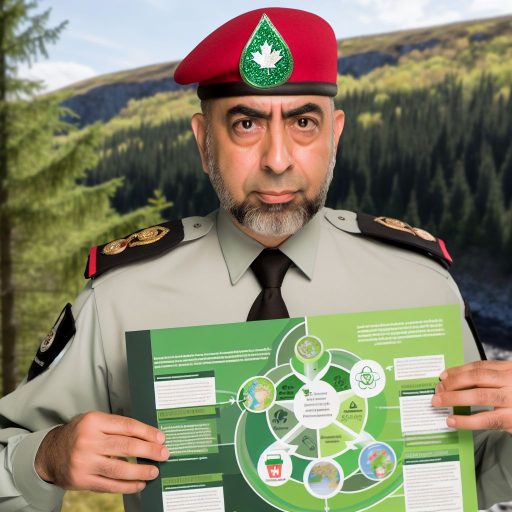Overview of the Canadian Job Market for Environmental Officers
The job market for environmental officers in Canada is thriving.
Various industries are actively seeking qualified professionals.
Environmental protection has become a priority for many organizations.
Government regulations and public awareness both drive this trend.
Increasing Demand Across Sectors
Many sectors are experiencing increased demand for environmental officers.
Industries such as energy, construction, and agriculture lead this hiring surge.
In particular, renewable energy companies require more environmental expertise.
This shift aligns with Canada’s commitment to reducing carbon emissions.
Skills and Qualifications
Employers look for specific skills in their candidates.
A background in environmental science remains crucial.
Additionally, certifications in environmental management add value.
Strong analytical and communication skills are also essential.
Regional Opportunities
Different provinces offer unique job opportunities for environmental officers.
British Columbia leads in hiring due to its emphasis on sustainability.
Ontario’s industrial sectors also create numerous job openings.
Alberta’s energy transition has further expanded its job market.
Networking and Job Resources
Networking plays a vital role in securing employment in this field.
Professional organizations like the Canadian Environmental Association offer support.
Job boards and online platforms also connect job seekers with employers.
Social media can further enhance job search efforts.
Key Industries Hiring Environmental Officers
Natural Resource Sector
The natural resource sector is a primary employer of environmental officers in Canada.
Companies in mining and forestry actively seek professionals to oversee environmental practices.
They aim to minimize ecological footprints and comply with regulations.
For example, Lac Minerals is among the leading firms tackling these challenges.
This sector offers numerous opportunities for those passionate about environmental stewardship.
Unlock Your Career Potential
Visualize a clear path to success with our tailored Career Consulting service. Personalized insights in just 1-3 days.
Get StartedEnergy Production
Energy production companies are increasingly aware of their environmental impacts.
In particular, renewable energy firms are hiring environmental officers to support sustainable practices.
Companies like NRG Energy focus on reducing emissions and enhancing their green initiatives.
These roles often involve developing strategies for efficiency and sustainability.
Manufacturing Industry
The manufacturing industry also plays a significant role in hiring environmental officers.
As regulations become stricter, companies are investing in environmental compliance.
Firms such as Bombardier are focused on sustainable innovation in their production processes.
Environmental officers help these firms navigate complexities and improve sustainability.
Construction and Engineering
Construction and engineering firms are continuously seeking environmental expertise.
They require professionals to ensure projects adhere to environmental regulations.
For instance, EllisDon Corporation prioritizes sustainability in its building practices.
Environmental officers assess projects for risk and facilitate eco-friendly methods.
Waste Management and Recycling
The waste management sector is rapidly expanding and hiring environmental officers.
Utilities like Waste Connections Canada are focused on waste reduction strategies.
These professionals are crucial for promoting recycling and sustainable waste practices.
They ensure compliance with local, provincial, and federal regulations.
Consulting Firms
Environmental consulting firms are another key player in hiring professionals.
These firms require environmental officers to support their clientele.
Companies such as Golder Associates provide essential services in environmental assessment.
Environmental officers analyze data and recommend improvements on ecological practices.
Educational Qualifications and Certifications Required for Environmental Officers in Canada
Understanding Educational Requirements
Most environmental officer positions require at least a bachelor’s degree.
Relevant fields include environmental science, biology, or engineering.
Many employers prefer candidates with advanced degrees.
A master’s degree in environmental management adds significant value.
Certification Programs
Certifications enhance a candidate’s qualifications significantly.
The Canadian Environmental Professional (CEP) designation is highly regarded.
This certification demonstrates expertise in environmental practices.
Another notable option is the Environmental Practitioner (EP) designation.
Additional Skills and Training
Soft skills are equally important in this field.
Strong communication skills enable effective collaboration.
Analytical abilities aid in problem-solving and decision-making.
Many organizations offer workshops and training courses.
These programs cover the latest environmental regulations and technologies.
Staying Current with Regulations
Environmental officers must stay informed about policy changes.
Continuous education is crucial for professional development.
Certifications often require ongoing education to maintain status.
Attending seminars and conferences can enhance industry knowledge.
Gain More Insights: Communication Skills for Correctional Officers in Canada
The Role and Responsibilities of Environmental Officers in Various Industries
Key Responsibilities
Environmental officers play a vital role in sustainability efforts.
They ensure compliance with environmental regulations.
Additionally, they monitor environmental impacts across operations.
Moreover, they develop environmental management systems.
This ensures continuous improvement in sustainability practices.
Industries Hiring Environmental Officers
Several Canadian industries actively look for environmental officers.
These include manufacturing, agriculture, and construction.
Furthermore, the mining and oil sectors are also in need.
Each industry has specific tasks for these professionals.
Manufacturing Sector
In manufacturing, environmental officers focus on waste management.
They aim to minimize pollution and resource consumption.
Additionally, they implement recycling programs and efficiency initiatives.
Agriculture Sector
In agriculture, these officers promote sustainable practices.
They oversee land use and manage pesticide application.
Moreover, they educate farmers on soil and water conservation.
Construction Sector
The construction sector requires environmental planning and assessments.
Environmental officers ensure site compliance with regulations.
They also address issues related to noise, dust, and waste disposal.
Career Development and Opportunities
Opportunities for environmental officers are on the rise.
They are increasingly in demand as companies prioritize sustainability.
Training and certifications can enhance their marketability.
Moreover, networking within professional organizations can open doors.
Discover More: Impact of Border Services Officers on Canadian Economy
Information on Salary Ranges and Employment Benefits for Environmental Officers
Understanding Salary Ranges
The salary range for environmental officers varies significantly.
Several factors determine this variation, including experience, location, and industry.
On average, environmental officers earn between $60,000 and $90,000 annually.
Entry-level positions typically offer salaries closer to $60,000.
However, seasoned professionals with extensive experience can earn upwards of $100,000.
Specialized roles in management or consulting often command higher salaries.
Moreover, salaries may differ based on the province or territory.
For instance, positions in urban areas generally pay more than those in rural locations.
Overall, environmental officers can expect competitive salaries that reflect their expertise.
Employment Benefits
In addition to salaries, environmental officers often receive attractive employment benefits.
Health insurance is frequently provided, covering medical and dental expenses.
Furthermore, many employers offer retirement plans to help secure financial futures.
Vacation days and paid time off are standard benefits in this field.
Additionally, some organizations offer flexible working hours.
Professional development opportunities are highly valued in environmental sectors.
Many companies support further education and certifications for their employees.
This commitment to professional growth enhances workforce skills and job satisfaction.
The combination of salary and benefits makes this career path appealing.
Explore Further: Canadian Provinces with High Demand for Environmental Officers

Current Trends in Environmental Hiring Practices Across Canadian Industries
Growing Demand for Environmental Officers
Many Canadian industries are currently seeking qualified environmental officers.
This demand stems from increasing regulatory requirements.
Moreover, companies aim to enhance sustainability initiatives.
For instance, organizations in natural resources are expanding their environmental teams.
Simultaneously, the tech sector is hiring more sustainability experts.
Focus on Educational Background
Employers prioritize candidates with relevant degrees in environmental science.
Degrees in sustainability and related fields are also highly valued.
Furthermore, certifications in environmental management are advantageous.
Candidates with experience in compliance matters gain a competitive edge.
Job postings consistently highlight these educational requirements.
Emphasis on Soft Skills
Employers increasingly seek candidates with strong communication skills.
Collaboration and teamwork are vital in environmental roles.
Moreover, adaptability to changing regulations is crucial.
Problem-solving abilities remain in high demand as well.
In essence, soft skills complement technical expertise effectively.
Utilization of Technology
Technology plays a significant role in contemporary environmental practices.
Companies are leveraging software for environmental impact assessments.
Data analysis skills are becoming essential for prospective candidates.
Moreover, familiarity with environmental modeling tools is beneficial.
This trend reflects a growing reliance on data-driven decision-making.
Impact of Corporate Sustainability Goals
Many organizations are launching ambitious sustainability goals.
Environmental officers often lead initiatives to achieve these targets.
Companies publish detailed sustainability reports to showcase progress.
This transparency fosters trust with consumers and stakeholders.
Consequently, the role of environmental officers becomes increasingly strategic.
Regional Variations in Hiring Practices
Hiring practices for environmental officers can vary across provinces.
In British Columbia, forestry industries have heightened their recruitment efforts.
Conversely, Ontario’s manufacturing sector is prioritizing green innovations.
Furthermore, Alberta’s oil and gas companies emphasize environmental stewardship.
Such regional differences highlight specific local needs and priorities.
Uncover the Details: Roles and Responsibilities of an Environmental Officer
Challenges Faced by Environmental Officers in the Job Market Today
Competition Among Qualified Candidates
Environmental officers face intense competition for job openings.
Many candidates possess advanced degrees and relevant experience.
This oversupply of qualified individuals makes securing a position challenging.
Furthermore, companies often seek specific skill sets that can be hard to find.
Industry-Specific Demands
Different industries have unique environmental requirements.
This diversity complicates the job search for environmental officers.
Candidates must tailor their skills for specific sectors, such as oil or renewable energy.
Moreover, staying updated with regulations in each industry is essential.
Technology Adaptation
The rise of technology demands ongoing learning for environmental officers.
Many companies now use sophisticated tools for monitoring and reporting.
Environmental officers must be proficient in these technologies to remain competitive.
Consequently, continuous professional development becomes crucial.
Regulatory Changes
Frequent changes in environmental regulations pose a challenge.
Keeping up with these updates requires vigilance and adaptability.
Environmental officers must ensure compliance with evolving legal frameworks.
Failure to do so could negatively impact job security and reputation.
Geographic Limitations
Job opportunities for environmental officers may be geographically restricted.
This limits candidates to specific regions where demand exists.
Moreover, relocation can be a significant hurdle for some individuals.
As a result, many talented officers may remain underemployed.
Public Perception and Funding Issues
Public perception of environmental issues influences job availability.
When funding for environmental projects decreases, job opportunities can dwindle.
Economic downturns often lead to budget cuts in environmental departments.
Environmental officers must adapt to these fluctuations while seeking stability.
Future Outlook and Growth Opportunities in Environmental Careers in Canada
Growing Demand for Environmental Professionals
Environmental concerns are increasingly taking center stage in Canada.
As industries evolve, they seek professionals who can manage sustainability efforts.
Companies across sectors recognize the importance of environmental compliance.
Consequently, there is a rising demand for skilled environmental officers.
Key Industries Hiring Environmental Officers
Several sectors actively recruit environmental professionals today.
For instance, the renewable energy sector is expanding rapidly.
These companies need experts to ensure compliance with environmental regulations.
Similarly, the construction industry seeks professionals to implement sustainable practices.
Furthermore, the mining and forestry sectors require guidance for environmental stewardship.
Innovation and Technology Driving Growth
Technological advancements are reshaping environmental careers.
From data analysis to innovative waste management solutions, opportunities abound.
Additionally, green technology startups are emerging, creating diverse roles.
These positions include sustainability consultants and environmental data analysts.
Potential for Career Advancement
The field of environmental careers offers robust advancement opportunities.
Skilled professionals can progress into management or policy-making roles.
Moreover, interdisciplinary skills are becoming invaluable in this sector.
Networking and ongoing education play crucial roles in career growth.
Growth Potential in Environmental Careers
The future of environmental careers in Canada looks promising.
With continued emphasis on sustainability, job prospects are expanding.
Ultimately, those passionate about the environment will find fulfilling careers.




